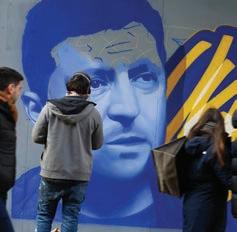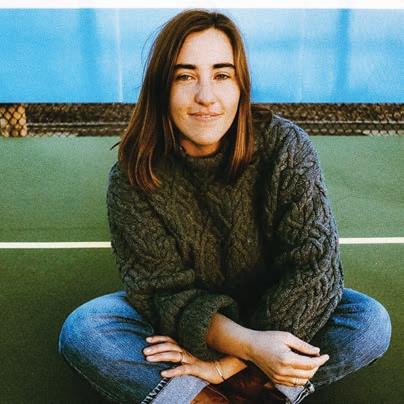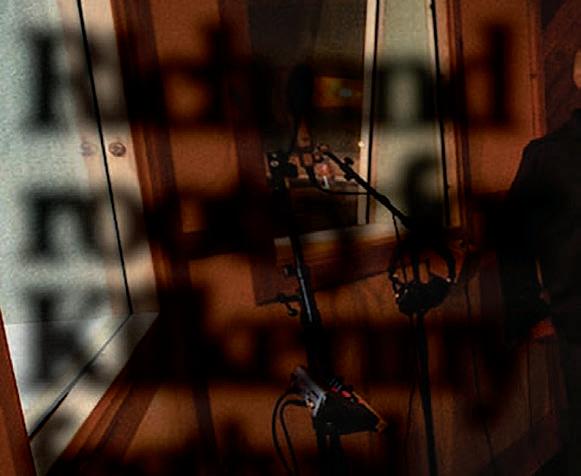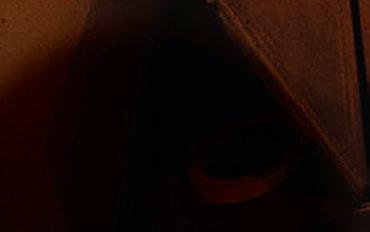
20 minute read
Marianne Heron

AS I SEE IT
Advertisement
MARIANNE HERON
Every now and then I come across a mind-boggling fact. Here’s one: a mature native oak tree may host many hundreds of species. Imagine that; whether you are a bird or a beetle, a mouse or a moss, a fungi or a fern, you can call that tree home.
One of the venerable trees in question was pointed out by Mary O’Neill-Moloney, head guide at Kilmacurragh during a tour of Kilmacurragh, National Botanic Garden, Co Wicklow. I must admit my count of tree residents hadn’t got much beyond the occasional bird or squirrel. Nor had I realised just how old some trees can be. Some of the yew trees along the yew walk at Kilmacurragh, where a monastic settlement was founded by St Moochorog in the in the 7th Century, date back to Tudor times.
Usually, I am more focussed on the ‘treeness’ of trees, a bit like Shinrin-Yoku, the Japanese healing art of forest bathing. is is a mindful way of connecting with Nature and allowing the senses to take in the pleasures that woodland o ers. I have some special bathing companions and am lucky enough to live close to some truly giant trees — Sequoiadendron giganteum (picture) . In their native habitat in California where they were discovered in 1853, they can grow to 300 feet high, the largest living organism on earth. With a girth of up to 70 feet they aren’t the easiest of trees to hug. But standing under one of them gazing upwards and taking in the resinous scent of tree armpit (branchpit?) certainly helps me to put the world in perspective. ese giants also bring home to me what trees can do for us. We are forest poor in Ireland, a country which was once 80% covered by native forests, before wholesale felling for ships, buildings and industry began from Tudor plantation onwards. Now we have only 11% of land under forest compared with the European average of 30%.
Aside from their value as habitat, the trees we do have can be a cost e ective way to o set carbon emissions, pulling CO2 out of the air, binding it with sugar through photosynthesis and releasing oxygen. In a year, an acre of forest can absorb twice the amount of CO2 emitted by the average car’s annual mileage. e trouble is that we don’t have enough of the right kind of forests. Only 1% of our forest coverage is of native trees like oak, birch and elm, the rest is mainly a monoculture of Sitka spruce, ne for commercial use but which can be a source of carbon release rather than a carbon sink when bog or wetlands are ploughed up and drained in order to plant them and when they are felled. Dark and densely planted, they are also an inhospitable environment for wildlife ora and fauna. ere is growing awareness of the importance the Amazon Rain Forest and its value to the planet as carbon sink and the threat posed to it by agriculture. But we need to be more conscious of the need to plant more trees and our own native rain forests. Trees thrive better together as a community, supporting each other, exchanging nutrients via their root systems, often aided by the mycorrhizal networks of fungi.
Spring has a way of making us more aware of the gloriousness of trees.In the next couple of weeks my view the nearby valley will be transformed into a patchwork of colour from pink to acid green as trees burst into leaf.
Just now there is a blackbird singing a veritable symphony at the top of a larch tree, announcing his territory. He might be praising trees too.
There be giants : why we need more trees
How you defeat your anxiety with hypnotherapy
ANDREW MCDONALD HYPNOTHERAPIST
YOU have two major parts of your mind. e conscious and the subconscious. e rst is responsible for all the things you do deliberately, the second for everything you do on autopilot.
All purposeful action is controlled by your conscious. All your behaviours and habits by your subconscious. Which do you think is more powerful?
If you said your subconscious, you’d be absolutely right. is is why it is so di cult to overcome anxiety with your conscious mind. It’s the equivalent of an unarmed, infant human child going up against a fully grown, adult gorilla. ere’s only going to be one winner.
Yes, I know David beat Goliath, but he did that with a sling full of shot, not a right hook.
Anxiety is a way of being. It is a behaviour. A habit.
Smokers nd it very dif cult to quit, right? Again because they are trying to defeat an unconscious, habitual behaviour with their conscious, deliberate mind. In the battle between autopilot v purposeful action, the former has an in nite advantage.
What if you could turn all that on its head?
You can. And it’s easier than you ever imagined. All you need is to manipulate a natural physical process to your advantage. In other words, use your subconscious.
Here’s how.
You know that feeling just before you fall asleep? at point where you aren’t fully conscious but you aren’t completely unconscious either? Chances are, if you’re reading this, you experience that every day. at’s the point where your conscious and subconscious are in harmony and communicating most e ectively with each other.
Now, whilst it would be a bad job to start the chatter going between these two parts of the mind when you’re trying to fall asleep, it’s perfectly possible to reach that state at other times of the day. is is where hypnotherapy comes in. Hypnosis is not weird, nor is it magical, all it does is relaxes you into that between consciousness and unconsciousness state where the real work can begin.
Once you are in hypnosis, just like when you are at that point between being awake and falling asleep, your conscious and unconscious minds are speaking to each other. At that moment, the purposeful action you want to achieve, being less anxious, can inform your habitual behaviour of its desires. is is why a hypnotherapist will hold a consultation with you prior to an appointment. To nd out exactly what you want to get out of life. A discovery meeting where you express how you want to defeat your anxiety, why and what life would be like for you if anxious thoughts and behaviours were no longer part of it.
It is those ideas that a hypnotherapist will then speak back to your unconscious mind when they have you in that deeply relaxed state. From there, your conscious thoughts become subconscious behaviours and habits. A life without anxiety awaits.
Natural care for your teeth
CLAIR WHITTY
CARE for your teeth and gums the natural way with Buccotherm, natural oral care for the whole family.
Used and trusted by dentists and hygienists in France, Buccotherm make a full range of oral care products including toothpaste, oral sprays and chewing gum.
Every Buccotherm product is formulated with thermal spring water, sourced directly from the spa town of Castéra-Verduzan in France. Rich in mineral salts and trace elements, with unique soothing and remineralising properties this water has been used for centuries for all kinds of ailments, particularly those of the throat and mouth.
Buccotherm Dental Spray is a unique solution for anyone who su ers with dry mouth, which can happen if you don’t produce enough saliva. Dryness can be also be age related or can occur after cancer treatment. Simply use the spray several times a day to hydrate and humidify your mouth. is Dental Spray also protects the teeth and mucous membrane from acid attacks, soothes irritation, reducing gum sensitivity and occasional bleeding too. It’s perfect to clean the interdental spaces in between braces. 100% natural and like the other Buccotherm products it contains the unique spa water which is rich in mineral salts and trace elements.
If you’re worried about bad breath, choose Fresh Breath Oral Spray which is certi ed organic with 99% natural ingredients. It’s perfect for long lasting fresh breath and an ideal size for your pocket or handbag.
Buccotherm toothpastes are certi ed organic, contain a minimum of 97% natural ingredients - formulated with or without uoride to suit everyone’s choice.
An everyday essential, Buccotherm Tooth Decay Toothpaste is used to help prevent tooth decay. It contains uoride, is made with 99% natural ingredients, and has a natural mint avour.
Or there’s the Fluoride Free Toothpaste for Sensitive Gums, it’s organic and made with 99% natural ingredients. is is particularly suitable for sensitive teeth or bleeding gums and can also be used for mouth ulcers, simply massage well on to the a ected area and don’t rinse. e Buccotherm range is adapted for all ages, for the younger members of the family there’s a full range of children’s toothpastes with uoride and uoride-free options.
Especially designed for babies there’s a Teething Gel and Teething Kit for your baby’s gums and rst teeth. e toothbrush has extra-soft bristles and is ergonomically shaped for an easy grip and to prevent the risk of the baby pushing the brush too far into their mouth. e teething gel is organic with chamomile and marshmallow extracts and contains 98% natural ingredients. is is a lovely range that I think you’ll like.

Shop online at www. naturalhealthstore.ie Natural Health Store, Market Cross Shopping Centre Phone: 056 7764538 Email: info@ naturalhealthstore.ie
Putin’s holy war blessed by Orthodox church
WHEN Russia launched NEW military intervention in defence of embattled Syrian President Bashar al-Assad in October 2015, Bashar received a clerical blessing. Patriarch Kirill, the powerful leader of the Russian Orthodox Church and a close ally of President Vladimir Putin, declared the operation “a responsible decision to use military forces to protect the Syrian people from the woes brought on by the tyranny of terrorists”. e spokesperson for Kirill’s church went even further. “ e ght with terrorism is a holy battle and today our country is perhaps the most active force in the world ghting it,” said the head of the church’s public a airs department, Vsevolod Chaplin, in a quote reported by Interfax news agency.
Seven years later, Kirill and his loyal clergy now deliver sermons about their country’s role in another righteous, holy battle. It doesn’t matter that many Ukrainians weathering the brunt of the Russian war machine are Kirill’s cocongregants — there are some 12,000 parishes in Ukraine subject to the church in Moscow. As Russia embarks on a new large- scale o ensive in the east of the country, Kirill has articulated little concern about the millions of Ukrainian lives hanging in the balance.
Instead, the head of the Russian Orthodox Church has sounded the same sort of ominous and profoundly ideological rhetoric as Putin. He cast the ght as a religious and national drama, an existential battle of good and evil, a clash between RussoSlavic tradition, values and unity and the corrupting foreign in uences festering at Russia’s border.
“We have entered into a struggle that has not a physical, but a metaphysical signi cance,” the patriarch said in a sermon on March 6.
Kirill went on, claiming God was on Russia’s side and expanding his critique of Western liberalism: “Today there is a test for the loyalty to this new world order, a kind of pass to that ‘happy’ world, the world of excess consumption, the world of false ‘freedom,’ ” he said. “Do you know what this test is? e test is very simple and at the same time terrible — it is the gay pride parade.”
You may be wondering what LGBT rights have to do with the bloody war in Ukraine. But Kirill has long framed Russian geopolitical challenges in these terms, as the con ict between a conservative, culturally virtuous Russia and a debauched, immoral West. His messaging has undergirded the more secular positions of the Kremlin, helped shape Putin’s own post-Soviet nationalist project and now adds a gloss of legitimacy to a stumbling Russian war e ort.
“Any war has to have guns and ideas,” says Cyril Hovorun, Professor of Ecclesiology, International Relations and Ecumenism at University College Stockholm. “In this war, the Kremlin has provided the guns, and I believe the church is providing the ideas.”
Kirill is in particular credited with propagating the doctrine known as ‘Rusty Mir’ or ‘Russian World’. It invokes a vision of Russia, Belarus and Ukraine as one nation united by a shared founding history of settlement by Volga Vikings and the 10th century conversion to Orthodox Christianity. Much of that hallowed history, it so happens, took place in locations that are in Ukraine.
“To some ears, this dogma might sound peaceful and inclusive, but critics say Russia is using it to reassert dominance over territory it controlled during the Russian Empire and Soviet Union,” Whalen explained. “Putin has embraced the doctrine in recent speeches, claiming that Ukraine has never really existed as a separate state and has historically belonged to lands led by Russia. Historians say that is at-out wrong.”
Kirill has explicitly urged Russians to back their government.
As Putin’s rule entered an all-the-more repressive phase in recent weeks, the patriarch called for public support for the Kremlin so it can “repel its enemies, both external and internal”. ere are already reports of Russian priests losing their jobs after delivering sermons calling for an end to the war and Ukrainian su ering.
So-called ‘anti-imperialist’ leftists in the West often value Putin’s Russia as a counterweight to Washington’s designs as a global hegemon. But the illiberal religiosity underlying the autocrat’s strongman rule has also made Putin a somewhat popular gure among American evangelicals and the religious right.
His All-Holiness Ecumenical Patriarch Bartholomew says: “We are very sorry for the attitude of His Beatitude Patriarch Kirill of Russia. He should not have identi ed so much with President Putin and even called Russia’s war against Ukraine ‘sacred’.”
Hundreds of Orthodox priests in Ukraine and elsewhere, though, are less impressed. More than 320 signed a letter recently accusing Kirill of “heresy” for his warmongering and demanding he be brought before an ecclesiastical tribunal to be deposed.
“Kirill committed moral crimes by blessing the war against Ukraine and fully supporting the aggressive actions of Russian troops on the Ukrainian territory,” they wrote. “It is impossible for us to remain in any form of canonical submission to the Patriarch of Moscow.” ( e political tensions between Russia and Ukraine had already led to a split within the latter’s Orthodox community, with some congregations no longer associating themselves with the Moscow patriarchate.)
And counterparts elsewhere have made Kirill aware of their disquiet, too. In a video call last month with Kirill, Pope Francis warned against the use of the Christian cross to justify an invasion and war — Kirill recently presented an icon to a Russian commander in charge of a number of divisions ghting in Ukraine.
“Once upon a time there was also talk in our churches of holy war or just war,” the Pope is reported to have told Kirill last month. “Today we cannot speak like this.”

How the invasion has changed the world
THE fallout from Putin’s invasion of Ukraine on February 24 also has repercussions far beyond Ukraine. It has forced nations to rethink neutrality and refugee policy, and it threatens to destabilise the global economy. e world has changed, here’s how:
1. A warm welcome for Ukrainian refugees
More than 4.6 million Ukrainians have left the country, with many eeing into neighbouring states such as Poland and Romania. Not all of these governments had laid out the red carpet for refugees in the past, but to accommodate this in ux, European leaders installed a new playbook, forging political consensus and streamlining the asylum-seeking process.
Farther away, even Japan has moved to accept dozens of displaced Ukrainians — a remarkable move by a country that historically has been unwelcoming to asylum seekers. As of early April, Tokyo has welcomed more than 400 people — with some ying on a government-chartered plane s. e warm welcome o ered to Ukrainian refugees has raised eyebrows, with World Health Organization Director General Tedros Adhanom Ghebreyesus recently noting that countries such as Ethiopia and Yemen received ‘not a fraction’ of the spotlight Ukraine has, a fact noted by our columnist Paul Hopkins some weeks back in a comment pice of ‘selective empathy’.
2. A rethinking of political nonalignment
Several countries that joined the Western-led nancial war against Russia were either traditionally politically neutral or had close economic ties with Russian oligarchs.
Shortly after the invasion, Switzerland announced that it would join the European Union in imposing sanctions on Moscow, in a sharp departure with its long-standing neutrality. Monaco, a playground for Russia’s wealthy elites, also moved to freeze the assets of Russian oligarchs in accordance with EU sanctions.
Similarly, Singapore made what it called an “almost unprecedented” move to impose sanctions on a country without a UN Security Council resolution.
3. e sanctions are biting
While Russia’s currency has recovered some ground after its post-invasion collapse, the World Bank forecasts that the Russian economy may contract 11.2 percent this year.
After the fall of the Berlin Wall, Russians took to Western brands from McDonald’s to Miu Miu. e international backlash to Putin’s 2014 annexation of Crimea began the decoupling of Russia’s society and economy from the Western world, but the invasion has accelerated the process.
Under pressure from their home governments and consumers, major companies and organisations have moved to suspend or exit operations in Putin’s country, depriving Russians of access to many consumer goods. International sporting events and prominent cultural institutions have also severed ties with Russian participants. Before the war, Ukraine was the world’s fourth-largest exporter of corn and wheat. Russia, the world’s largest oil exporter, was also a top supplier of fertiliser. But the protracted con ict has driven up commodity prices globally, jeopardising food security and poverty alleviation e orts in Africa and the Middle East. e World Food Program has said that 41 million people in western and central Africa may be a ected by a food and nutrition crisis this year, as the region confronts the highest prices in a decade for products like grain, oil and fertiliser. e war has also set o panic buying of basic foodstu s in countries such as Egypt, Syria and Lebanon that are reliant on Ukraine exports.



A GREAT lineup that includes e Delines, Jesse Dayton, e Hanging Stars, Jake Xerxes Fussell, Joana Serrat, Margo Cilker, His Lordship, TK & e Holy Know-Nothings, e Remedy Club and Danny George Wilson are set to entertain at 23rd Kilkenny Roots Festival from Friday, April 29 until Monday, May 2.
Acts come from the US, UK, Spain, Austria and Ireland.
Many shows are already sold out, including e Delines, Jake Xerxes Fussell, TK & e Holy KnowNothings, e Hanging Stars and Margo Cilker.
In addition to the ticketed shows, there will be 60 gigs on the free Smithwick’s Music Trail in venues throughout Kilkenny city. e festival kicks o with e Remedy Club in Billy Byrnes on the Friday and continues with an amazing musical lineup until the grand nale in Kyteler’s on Monday May 2 with Jesse Dayton and his band from Texas.
Tickets for the individual shows are available through shows are available through the festival website, https:// the festival website, https:// kilkennyroots.com/
Here’s what the critics are Here’s what the critics are saying the weekend’s line-up saying the weekend’s line-up
THE DELINES
“ e backing band delivers a soft, minimalist, soulful, and minimalist, soulful, and mostly noir cinematic mostly noir cinematic soundscape over which Vlautin’s stories which Vlautin’s stories about desperate characters unfold through Boone’s nuanced, emotive vocals. e subtle power vocals. e subtle power is riveting, completely is riveting, completely enrapturing the listener enrapturing the listener and leaving an indelible and leaving an indelible impact.”
Glide Magazine HIS LORDSHIP
e new project from guitarist James Walbourne ( e Pretenders, e Pogues, e Rails) and Kristo er Sonne ( e Pretenders, Willie Nelson), His Lordship is the sound of Walbourne unleashed as a frontman; a furious riot of raging guitar and perverted drums from another dimension.
engrossing magic, enabling some of Danny’s most romantic songs ever but equally some of his most unhinged.



Rich and rootsy for Kilkenny festival

DANNY GEORGE WILSON
Danny George Wilson (Grand Drive/Danny & e Champions Of e World/Bennett Wilson Poole) presents a vibrant and diverse collection of startling, impressionistic songs created in collaboration with Sussexbased, studio wizard Hamish Benjamin. is collision of straightforward, traditional songwriting with experimentation and noise, brings a fresh and
engrossing magic, enabling some of Danny’s most romantic songs ever but equally some of his most unhinged.
JAKE XERXES FUSSELL
“Fussell is a snappy, unshowy guitar player whose crisp picking adds air to the occasionally odd imagery of his reclaimed lyrics, a song collector with unimpeachable taste as well as a thorough knowledge of the American folk catalogue, and in particular a singer whose voice is robust yet gentle, always conveying the humanity of the songs he sings.”
Uncut Magazine, Album of the Month MARGO CILKER. (Both shows Sold Out)
“Pohorylle (her new album) is classic Americana – mostly carried by piano, guitar and strings – awash with grace, wisdom and allusive wordplay. Cilker only has a handful of EPs to her name, but it feels like the work of a truly seasoned talent.”
Uncut Magazine TK & THE HOLY KNOWNOTHINGS
TK & e Holy KnowNothings is perhaps Taylor Kingman’s most beloved project. Half-dutifully and half-facetiously self-dubbed “psychedelic doom boogie,” the group was born out of Kingman’s desire to create a loose, groove-heavy bar band that never sacri ces the importance of good, honest songwriting.
THE HANGING STARS
“ e London ve-piece do an accomplished take on the late-1960s sound of Los Angeles, where folk-rock bands such as the Byrds and Love met the cosmic country of Gram Parsons and Emmylou Harris.”
e Times UK

JAKE XERXES FUSSELL
“Fussell is a snappy, unshowy guitar player
Back to their roots: among those taking part in the weekend festival are The Delines; inset, Margo Cilker; below, le , Joana Serrat; and The Remedy Club
JOANA SERRAT
“Hailing from near Barcelona, Joana Serrat is one of the unexpected European treasures in the ever-expanding genre of Americana. Her fth album, all recorded in Texas with producer Ted Young (perhaps best known for working with Sonic Youth), is another treat that hints at yet even bigger things. Our guess is that it will sound incredible live. ”
Holler Magazine JESSE DAYTON.
“Jesse Dayton Is the Opinionated Songwriter at Americana Needs. He’s played with Waylon, Cash, and Du McKagan, but the Texas motormouth is at his best when he’s singing his own tune.”
Rolling Stone THE REMEDY CLUB
“ e Remedy Club might have been Ireland’s bestkept musical secret, but with its nutritious stew of Americana, Country, Roots and Rock, True Hand True Heart should put an end to all that. All in all, this is one album you could survive a lockdown with.”
Hotpress Magazine RÓNÁN HESSION & WILLY VLAUTIN in conversation
A unique opportunity to explore the common ground and di erences in their music and writing.
* Further enquiries to: John Cleere, Festival Director. Tel 0868146421 info@ kilkennyroots.com










